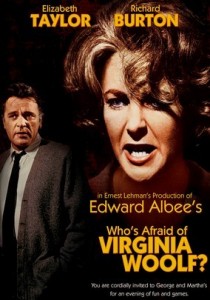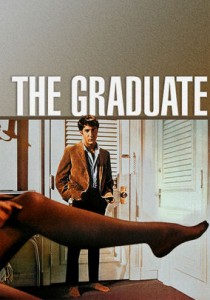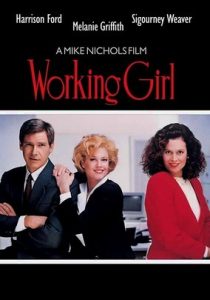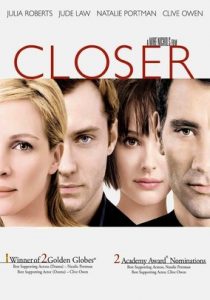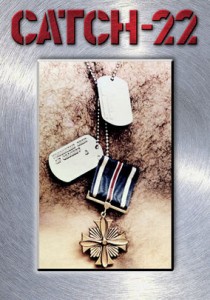Who’s Afraid of Virginia Woolf? -1966
Director Mike Nichols
Starring Elizabeth Taylor, Richard Burton
Top 250 Films #51
Scott’s Review #200
Reviewed December 3, 2014
Grade: A
Who’s Afraid of Virginia Woolf? This dark film, directed by Mike Nichols (The Graduate), is based on a play from the early 1960s.
Thankfully, the Production Code had been lifted by 1966, allowing edgier, darker films to be made—think The Wild Bunch or Bonnie and Clyde from the same period.
Who’s Afraid of Virginia Woolf? is dreary, bleak, and with damn good acting by all four principals.
George and Martha (Richard Burton and Elizabeth Taylor) are associate history professors and the college president’s daughter, respectively. They live in a small town in New England.
They have a complex, often bitter love-hate relationship.
One night, they invite young newlyweds Nick (George Segal) and Honey (Sandy Dennis), a new professor and his wife, over for drinks at 2:00 a.m.
From this point, a destructive night of verbal assaults and psychological games ensues with damaging and sad results for all parties involved, as their personal lives are exposed and dissected.
At the forefront are George and Martha, whose relationship is characterized by insults, neediness, secrets, and alcohol. After an evening out, they return home and have a vicious fight.
When their young friends arrive, the tension is thick.
Eventually, the young couple becomes sucked into the older couple’s web of dysfunction, aided by endless drinks throughout the night.
The film is shot in black and white, like a play, which I found highly effective. Most scenes occur in George and Martha’s house.
While all four actors are great (and were all Oscar-nominated), my standouts are Taylor and Dennis.
In my opinion, this role is Taylor’s finest acting performance. She is overweight, bitter, angry, frustrated, drunk, and, at times, vicious to her husband. This performance differs from many of her other film roles and is truly dynamite.
As her anger flares up, the heat and intensity oozing from the screen can be felt. She goes from vulnerable and soft one moment to a grizzled, bitter woman the next.
Conversely, Dennis is pure, innocent, kind, vulnerable, impressionable, and somewhat naive. Having had too much brandy and spent more than one occasion in the bathroom, Dennis successfully plays giddiness and innocence to the hilt.
Both Martha and Honey harbor dark secrets, which eventually are revealed.
The ambiance is just amazing. The black-and-white cinematography gives the film a hot, suffocating feel. It feels like a quiet little college hamlet, and the setting of the eerily quiet wee hours of the morning is conveyed successfully.
Each story, told mainly by George and Martha, is captivating in its viciousness (both usually belittling the other), and the film becomes mesmerizing in its shock value at the insults hurled.
What will they say or do next?
I loved the scene where Honey awkwardly dances at the late-night bar that the four of them go to. Also, the shotgun scene, where George obtains the gun from the garage during one of Martha’s insulting tales, is disturbing – what will he do with the gun?
The stories involving George and Martha’s son are sad and mysterious- the viewer wonders what is happening.
The final reveal still gives me chills.
Who’s Afraid of Virginia Woolf? (1966) is one of the most significant film adaptations of a play I have ever seen.
Oscar Nominations: 5 wins-Best Picture, Best Director-Mike Nichols, Best Actor-Richard Burton, Best Actress-Elizabeth Taylor (won), Best Supporting Actor-George Segal, Best Supporting Actress-Sandy Dennis (won), Best Screenplay Based on Material from Another Medium, Best Original Music Score, Best Sound, Best Art Direction, Black-and-White (won), Best Cinematography, Black-and-White (won), Best Costume Design, Black-and-White (won), Best Film Editing
